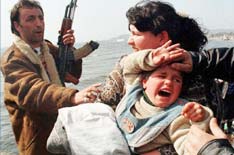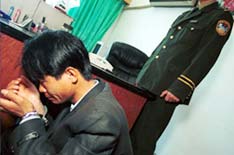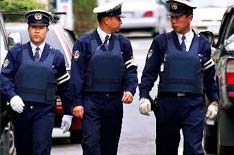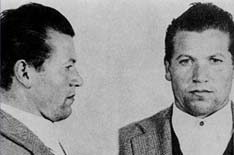Though organized trafficking rings exist in various sizes and structures around the globe, from Nigeria to Russia to the United States, the following four organized criminal groups are some of the most complex and notorious.
Albanian Gang

An Albanian gang member prevents a woman and child from joining an already overloaded boat full of illegal immigrants bound most likely for Italy. Photo: George Karachalis/Reuters |
ne of the most heavily trafficked areas on earth lies between the coasts of Albania and Italy in the Adriatic Sea. It is an ideal route between the impoverished regions of Eastern Europe and more affluent European countries like Italy, France, and Germany. Albania is a gateway for migrants from Moldova, Romania, and Bulgaria looking to travel West, but it is also a nation in economic turmoil, where unemployment has sparked a mass exodus of workers. Rampant government corruption and an entrenched organized crime network have made Albania a nearly ideal conduit for human trafficking. Albania’s gangs are particularly known as suppliers of child prostitutes. Most of the Albanian gangs’ victims are young women, many of them just girls, who have been orphaned or are members of large, rural families; the girls are seduced into the sex trade by promises of legitimate work overseas. Instead, they are taken by dinghy to southern Italy and then transported by taxi, train, or truck to the north, where they are forced to work as prostitutes. According to recent reports by Scotland Yard and Europol, these gangs are reputed to be extremely violent and well armed, with a sizable presence also in the London underworld’s heroin trade.
Chinese Snakeheads

This man was arrested in January 2001 as part of a Beijing directed crackdown on mafia-style criminal syndicates that are emerging on the Chinese mainland. Photo: China Photo/Reuters |
In June 1993, the Golden Venture, a ship carrying 300 illegal immigrants from China, ran aground off the shore of Rockaway, New York. Ten people died trying to reach safety. In the summer of 2003, Cheng Chui Ping, also known as Big Sister Ping, the alleged leader of the Chinese trafficking ring being held responsible for sending the Golden Venture to the U.S., was extradited from Hong Kong to face criminal charges in New York. Ping is accused of having smuggled hundreds or perhaps thousands of illegal Chinese immigrants into the U.S. since the early 1980s. The migrants, purportedly, were then detained in warehouses until smuggling fees of roughly $30,000 were paid off. Though in Manhattan’s Chinatown, Ping enjoyed a reputation as a benevolent person who assisted recent immigrants in finding work, federal prosecutors accuse her of being the infamous figurehead of an international human trafficking gang in the tradition of the Chinese snakeheads. Snakeheads are organized crime gangs in China that supposedly switched from drug to human trafficking to take advantage of the field’s vast potential for wealth. According to a report by the Australian Institute of Criminology, Chinese traffickers alone make between $2.4 and $3.5 billion each year. Many of the snakeheads’ customers hail from the Fujian province in East China, where villagers are attracted by reports of riches available in Western Europe, the United States, or Canada. Yet few are aware of the deplorable, sometimes life-threatening conditions under which they will be forced to make their journeys abroad, nor of the violent tactics that will be used to collect their payments upon arrival. A migrant’s family back in China may be forced to pay the traffickers’ sum to prevent their enslaved relative from being killed. In 2001, the BBC reported that London police had discovered one Chinese hostage who had had his finger sliced to the bone after he refused to rape a fellow migrant.
Japanese Yakuza

Japanese police officers in the streets of the Konohana district of Osaka in 1999, where gang activity was purportedly on the rise. Photo: Itsuo Inouye/AP |
The Japanese mafia is known as the yakuza and dates back to the time of the samurai. They are known for covering the majority of their bodies with tattoos and sometimes for the absence of their little finger, which yakuza members ceremoniously offer to higher-ranking gang members as an act of appeasement. The structure of the yakuza gangs is an intricate hierarchy, based upon a patriarchal father-son relationship known as oyabun-kobun in which new gang members pledge their loyalty to an established boss, who then provides the new recruit with guidance and protection. The yakuza are reported to boast more than 100,000 adherents and have close connections to legitimate business leaders and high-ranking governmental officials. Their criminal enterprises extend into gambling, real estate, the stock market, and gun smuggling. In terms of human smuggling, the yakuza are known to be highly involved in the Japanese sex trade; in particular, the procurement of prostitutes from countries such as China, Thailand, and Colombia. Reportedly, they work in coordination with Chinese and Russian gangs.
Italian Mafia

Taken in 1959, this is the last known photograph of the still-at-large Sicilian mafia boss Bernando Provenzano, the most wanted man in Italy. Photo: Reuters |
The Italian mafia is perhaps the most widely known organized crime group in the world, thanks in large part to its active presence in the United States and its portrayal in numerous motion pictures and television programs. The Italian mafia developed in Sicily in the feudal age, when lords hired brigands or bandits to guard their property. Today, the mafia is involved in everything from the drug trade and gambling to real estate and construction. In 2000, the BBC reported that organized criminal groups controlled one in five Italian businesses and had a combined capital of $800 billion. Situated between impoverished Eastern Europe and the affluent West, Italy is an important transit and destination country, particularly for migrants from Albania, Italian gangs reportedly cooperate with Albanian gangs in the trafficking of women and girls for prostitution. According to the Bundesnachrichtendienst, Germany’s foreign intelligence service, Italian gangs are trying to expand their operations further into Eastern Europe.
- Previous: Business Structures
- Next: Trafficking Routes


